Marsden Pointless
Mark Honeychurch - 13th May 2024
We saw a few weird things come out of the Parliament protests, but one of the weirdest is the attempts to “save” Marsden Point. Some of the protestors, egged on by conspiracy agitators like Brad Flutey and Damien De Ment, travelled directly from the protest at parliament in Wellington when the police shut it down, all the way up to Marsden Point, half way between Auckland at the top of the North island and site of the country’s only oil refinery, which was (and is) in the process of being decommissioned.
The reason for this field trip was to try to stop the loss of our “energy independence” / “energy stability” / “fuel security”. The protestors wanted to safeguard our ability as a nation to process crude oil and turn it into usable fractions like diesel and petroleum. Now, this worry is based on a real concern - without the ability to process crude oil, the government needs to ensure that we have enough reserves to be able to weather any foreseeable shortages. As a member of the International Energy Agency we are supposed to hold 90 days of refined fuel, and this proactively released MBIE document, titled “Fuel supply resilience without a domestic oil refinery”, explains that this reserve can be held either domestically (which we don’t do in NZ), or through advance purchases of overseas oil (which, interestingly, the government currently has to do, in order to ensure we meet our 90 day agreement). The document goes on to talk about the possibility of converting and expanding the fuel storage capacity of Marsden Point, as it transitions to becoming a transit terminal rather than a refinery.
However, the protestors aren’t taking the same nuanced view that the government takes. They seem to be of the opinion that the End of the World is nigh, and that when the world inevitably goes to hell in a hand-basket and we’re left cut off from the rest of the world, we will need to be energy independent to survive. Never mind that there are many, many other things we’d need to process or manufacture domestically to be truly independent of the rest of the world and maintain anything like our current quality of life. These guys have fixated on oil, so that’s what they’re going to fix. (As an aside, I have a strong feeling that the contrarian nature of conspiracy theorists, and their hatred of renewable energy and electric cars, may play a role in their selection of Marsden Point and its demonised oil as the thing they want to save)
Even NZ First seemed to get in on the act (no pun intended), making big promises about what they’d do if they came to power:
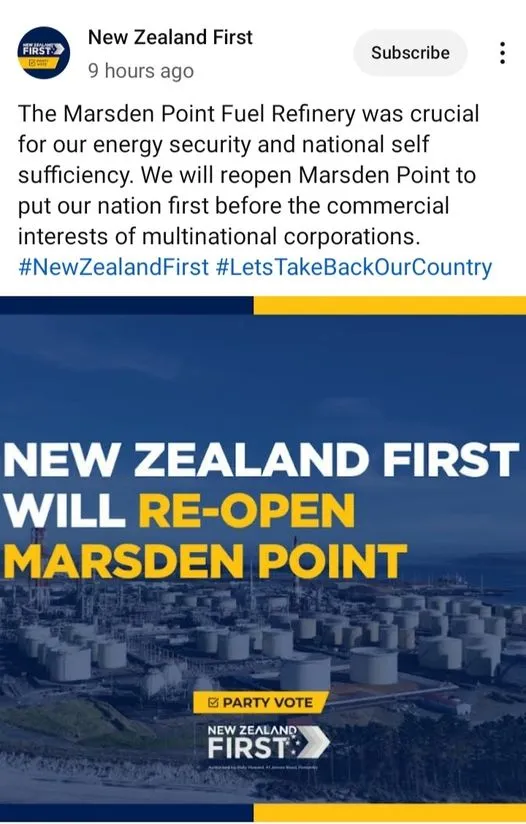
How exactly do the conspiracy theorists plan to become the saviours of New Zealand, and rescue us all from our collective stupidity? Well, at first the plan was to protest the closure and decommissioning of the refinery, owned by Refining NZ (who changed their name in 2022 to Channel Infrastructure). However, so far camping outside of the fenced off area and waving placards has not stopped, or even slowed down, the work of breaking down and removing the plant hardware.
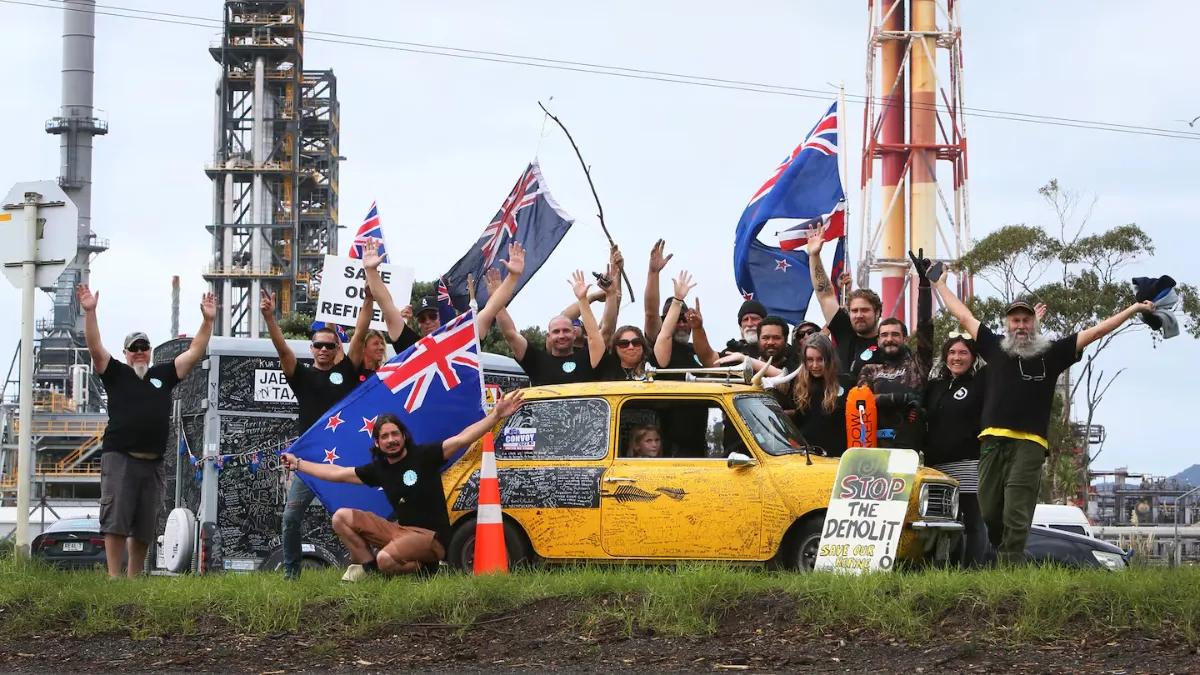
A new tactic, that has been spearheaded by a few protestors such as Karl Barkley (boiler maker), Richie Aplin (refrigeration engineer), Daniel Reurich (fitter) and Gabrielle Tamihana (events manager), is called “Operation Good Oil”, and involves the purchase of enough shares of Channel Infrastructure to be able to have a controlling vote at their AGM. Members of various Facebook groups, including Operation Good Oil, Collective Action For Energy Stability and Buy Back Controlling Shares of Marsden Point, all run by the same few protestors, urged their members to use the popular share app Sharesies to buy as little as $20 of shares and to vote at the AGM.
Approaching the date of the AGM, which happened at the very end of last month (on the 30th of April), the Facebook groups started talking about how they had a real chance of tipping the balance, as private ownership of the shares (outside of the major oil companies’ stakes) had tipped over 50%, reaching as high as 52%. The group naively thought that maybe, just maybe, all of these shareholders would side with them, and help them to get the refinery recommissioned. With this hope, a three-pronged plan was put in place and three resolutions were submitted to the AGM:
- Resolution 5: Vote for the “Operation Good Oil” shareholder proposal
- Resolution 6: Vote Karl Barkley onto the board of directors
- Resolution 7: Vote Daniel Reurich onto the board of directors
Of these two men who were being suggested for inclusion on the board, Karl appears to have been the most vocal and prolific throughout this campaign. One of our Wellington Skeptics in the Pub members even saw Karl with his van on the streets of Wellington a few days before the AGM (the AGM was held at the Sky Stadium in Wellington).
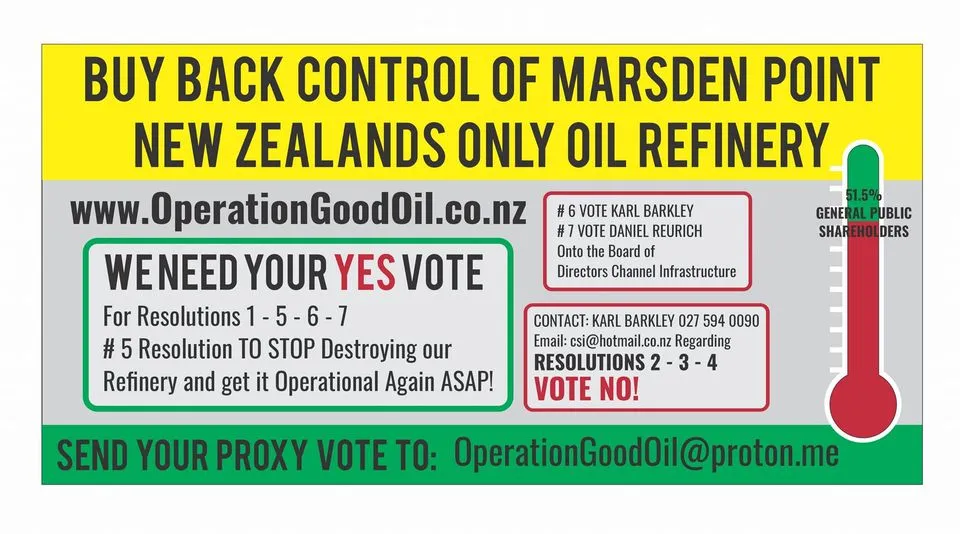
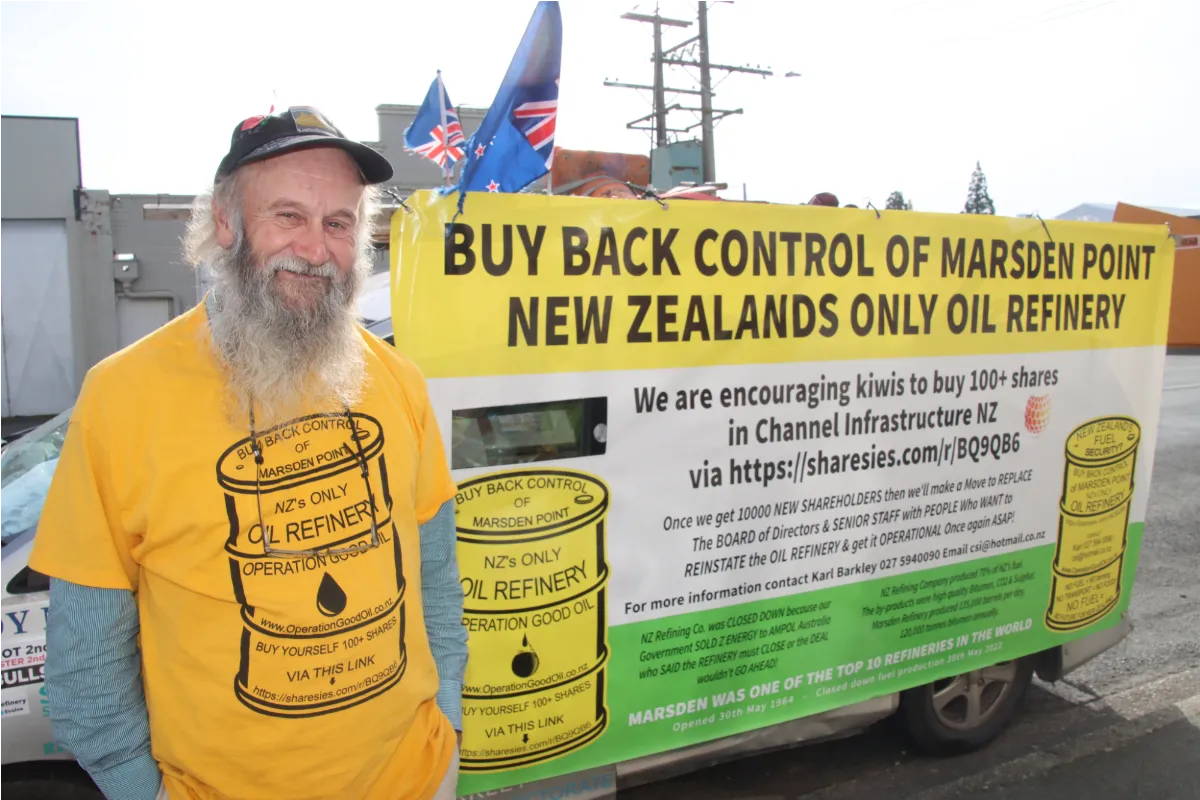
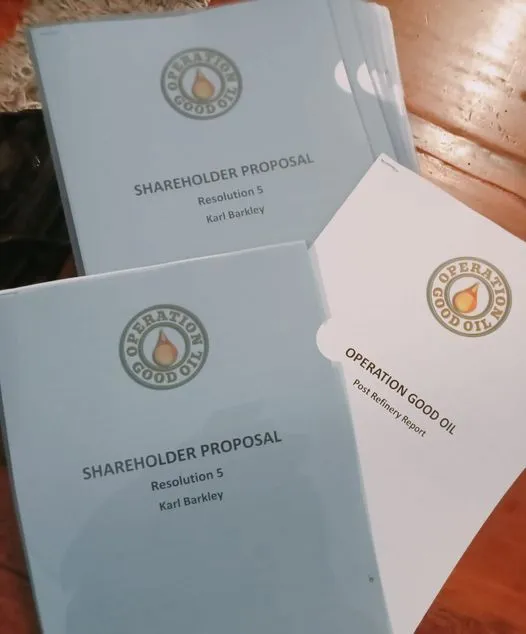
The report is an interesting read. It’s immediately obvious it’s not your average corporate proposal; page 2 has a quote from Jesus Christ, “Nothing is hidden that will not be made known” (there had been talk in the Facebook groups that some embarrassing secrets were going to be revealed at the AGM), and there are accusations on page 2 of financial mismanagement - I suspect that these are the revelations that were alluded to. These accusations are expanded on pages 8-18 (in section 2, titled “Creative Accounting, Shifty Deals and Wooly Hat Pulls for Shareholders”), where mention is made of Nostradamus (with a heading cheekily titled “Nostradamus in the stats department”), COVID denial (“Nobody needs reminding of the events of 2020 and 2021 in which it was alleged that a new and deadly virus was on the loose that would kill vast amounts of people if drastic measure were not taken”), unicorn farts, accounting magic (a euphemism for financial fraud), Tui adverts (an allusion to the phrase “Yeah right”, meaning disbelief. This one, unsurprisingly, was misspelled as “Tui add”), general typos and the most heinous of all grammatical crimes - American English spelling. Here’s an example of the resolution’s very down-to-earth phrasing, in a section titled “Killing the goose that lays the golden eggs” that accuses Channel Infrastructure of fraud:
“Could this bizarre move to make the refinery look as if it was a total lemon be an attempt to save egg on the face that would result from having to face the shareholders at the next AGM whilst holding a green balance sheet?”
Before this, in section 1, an argument is made that by moving to an import model Channel Infrastructure is destroying the environment by emitting a lot more CO2 and N2O than was created by shipping unrefined oil into the country. I’m not sure of the veracity of their claims, but given that the group appears to have guesstimated all of their calculations, and given that, in their own words “this section is by no means an exhaustive analysis of the shipping emissions created by the supply chain… It is intended to give people more than a “trust me bro” or “some guy on the internet told me” source”, I’m inclined to believe that their analysis is likely to be either horribly biased or just inaccurate due to mistakes.
Section 3 of the report is titled “Incredible Claims by the Prophets of Doomed Profits”, and section 4 mentions the Fuel supply resilience report I linked to earlier in this article, and seems to be a ham-fisted attempt by the protestors to understand geopolitics, predicting the behaviour of both Russia and Iran and suggesting that both countries would have the ability to cut off our oil supply. Section 5, about electric cars, contains a second mention of unicorn farts, this time in tandem with fairy dust, when attempting to prove that electric cars are not a viable technology.
The last section, Section 6, is titled “Rouge Shareholders and Rebel Directors Nominated”. I can only assume this is yet another typo - presumably Rouge is meant to be Rogue. This is the report’s conclusion, reproduced here in its entirety:
We would like to bring to the reader’s attention a move within the shareholders of Channel Infrastructure to conduct feasibility and cost study for a return to refining.
Two shareholders, Karl Barkley and Daniel Reurich have been nominated for directorships at this coming AGM on April 30 2024.
Mr Barkely has prepared and sent a proposal for resolution by the shareholders; it has been received by the board and added to the agenda for the meeting.
In a rather lengthy response, the board has recommended against the proposal because they believe it is no longer Channels responsibility and have fobbed off all responsibility and liability onto the government despite their rather murky behaviour and control over the plant which does actually exist despite their accountants saying it doesn’t.
We would highly recommend if you are a shareholder voting for the proposal and for the nominees if for nothing less than to throw a cat among the pigeons and to get some of our burning questions answered.
If you are not a shareholder, it is not too late. You can buy as little as $5 worth of shares on Sharsies and get voting rights to have a say. The more people who start to get involved and buy shares to make noises the more a company culture can start to shift at the top.
It is not a foregone conclusion yet that we can’t refine our own oil, the people who have made these bad decisions on behalf of all of New Zealand, be they government or executives are biting their nails right now because they get up every morning and flip coins to decide what they do next. Sometimes it comes up tails, sometimes it comes up heads.
The real question here is:
WHO IS THE HEAD AND WHO IS THE TAIL?
So, how did the AGM go? It’ll come as little surprise to anyone that, despite the group’s suggestion that they had a fighting chance of receiving overwhelming support from sympathetic private investors, as well as their followers who have been buying up the odd share or two, none of the group’s three resolutions were approved. The Operation Good Oil resolution received just over 1% of the vote at the AGM, and the two resolutions to elect Karl and Daniel received just under 1% each (and, from what I can tell, 60% of eligible votes were cast at the AGM). I’m not sure whether this 1% vote means that the group have convinced their supporters to buy up 0.6% of Channel Infrastructure’s vote, or whether they’ve managed to win over shareholders not connected to their cause, but I suspect it’s more likely to be the former. Karl himself, according to the AGM documents, holds just over a thousand shares.
In Channel Infrastructure’s comprehensive “Notice of Annual Meeting” for their 2024 AGM, they recommended against shareholders voting for any of Operation Good Oil’s three resolutions:
“The Board is not supportive of this proposal for the reasons set out in the box below labelled “Reasons for Board recommendation AGAINST Resolution 5” and therefore unanimously recommends that Shareholders vote AGAINST Resolution 5.”
“The Board recommends that Shareholders vote against the nominations of Mr Barkley and Mr Reurich for election as directors”
Karl and Daniel’s personal statements make for interesting reading, and their lack of relevant expertise is obvious:
“I, Karl Barkley have a vast experience in the Engineering and Construction Industry. I feel I have a lot to offer Channel Infrastructure NZ LTD as a nominated Board of Director. I have an engaging personality that is suited to sales, project management and team leader positions. I have mentored both apprentices and employees in addition to fellow co-workers. I enjoy working in a team situation and always strive to improve systems with a high regard for Health & Safety. Having owned my own business I understand the importance of hard work and I pride myself on being an honest, reliable and productive member of any team I work for.”
“Mr Reurich states that his background is in mechanical engineering and later began an Information Technology company which implements and supports Linux and Open Source Software based solutions. Mr Reurich was a council member and later treasurer for the New Zealand Open Source Society and was a co-developer working on Devuan GNU/Linux.”
The report is worth reading if you want to learn more about how Channel Infrastructure view the attempt to have the Marsden Point site recommissioned - it’s politely worded, but they make it clear that they consider the attempt to be misguided at best, and the candidates to be woefully inexperienced. The CEO’s and Chair’s speeches also make for interesting reading, although they both only mention the protestors briefly.
The Save Marsden Facebook groups already seem to be attempting to rewrite history. I found this posted the other day in one of the groups:
_From the strategy perspective, this was an opening salvo, those of us who work in the engine room always knew this and we expected a 5% or less of the vote so it’s not a suprise to us.
1st May 2024_
Of course, as often happens, the conspiracy crowd appear to have gotten hold of the wrong end of the stick in this case - a little knowledge can be a dangerous thing, as they say. Talking to James at our Skeptics in the Pub meeting the other day I learned that despite many of the Save Marsden groups’ claims that, come the apocalypse, we will be able to use the Marsden Point refinery to process the oil from our own local sources and become independent of the rest of the world for our petroleum needs, it turns out that the kind of crude oil that Marsden Point was able to process is not the same kind of crude oil that we have access to in our local oil fields. According to CoreGas, our domestic crude oil is “light-sweet crude” , whereas our refinery was only ever able to process a “medium-sour blend” of crude oil. Light means shorter carbon chains that are easier to process, and sweet means low in sulphur, which is an unwanted byproduct. Conversely medium means longer hydrocarbon chains that are harder to process (although not as difficult as heavy crude), and sour means a higher sulphur content. So, in essence, we export our good quality oil to Australia for processing, whereas we (until recently), imported from Asia the cheaper, more troublesome oil that our Marsden Point refinery was built for.
The Operation Good Oil’s argument that we are beholden to Iran and Russia for our oil imports, and therefore we need Marsden Point to remain operational as a refinery, seems like a very confused argument. At the beginning of the Ukraine/Russia war, for example, we dropped our percentage of purchased fuel from Russia from 14% to just 2%, showing that, at a pinch, we can simply start buying our oil from elsewhere. According to this Newsroom article, most of our oil until recently was being imported from the United Arab Emirates:
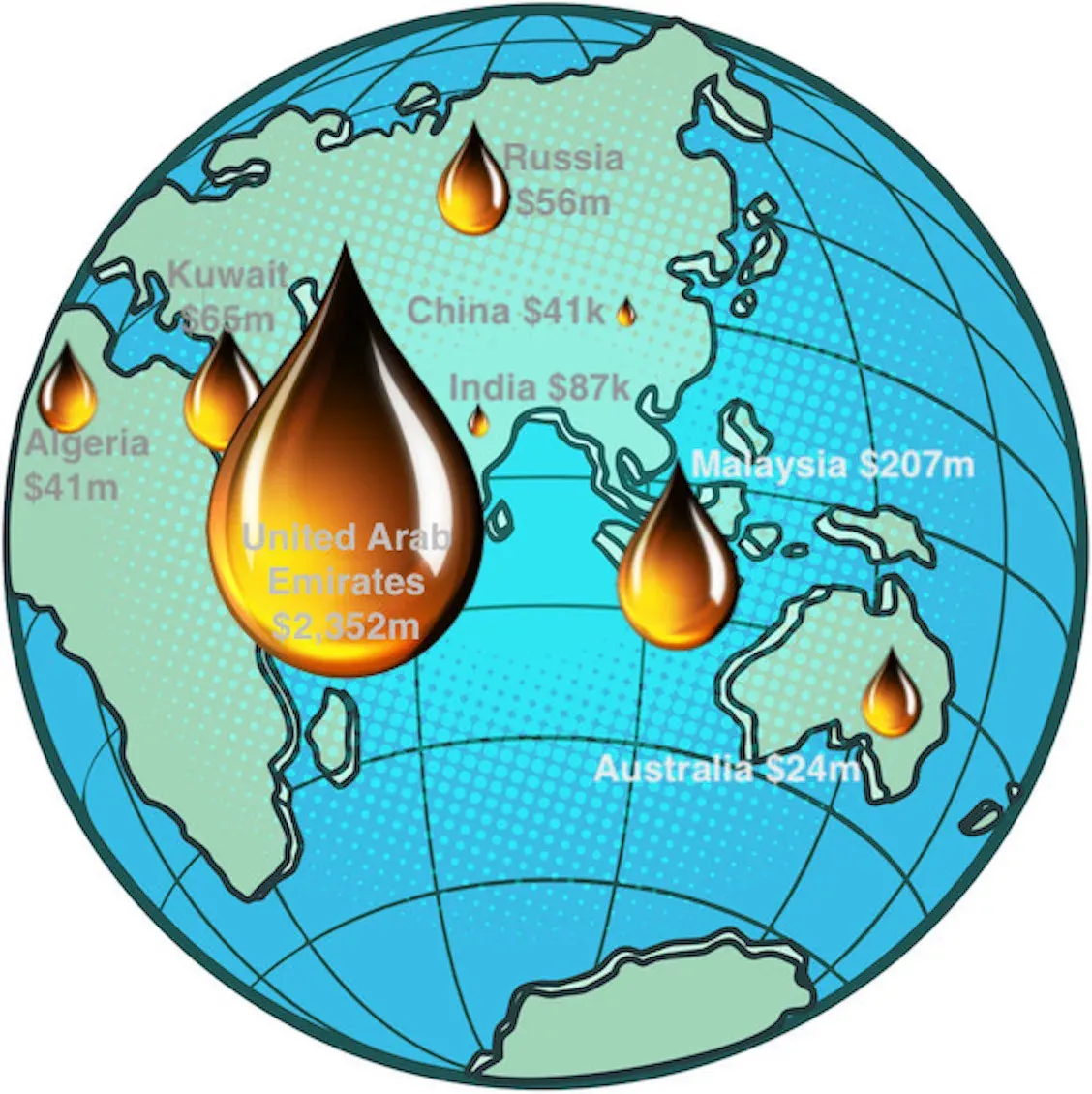
I’m not sure whether Operation Good Oil’s claim that Iran would be able to shut down the Strait of Hormuz and stop exports from the UAE is true (and I suspect the USA’s aircraft carriers would have a lot to say about it if they tried), but even if it was, this is a problem with crude oil imports from the UAE, and we’re not importing crude oil any more - we’re now importing refined petroleum products, and the breakdown of where we’re getting them from is different: according to MBIE, most of it “is imported from refineries in Singapore, South Korea and Japan” - much more geopolitically stable. Now, it turns out that these refineries are also being supplied with oil mainly from the UAE, so things aren’t much different now that we’ve moved from refining to importing. But, barring political strife in these three countries we now rely on - which doesn’t seem likely - I can’t see things being much worse now that we’re importing refined products than they were back when we were importing crude oil, at least from a geopolitical perspective.
The Newsroom article I linked to above has some interesting things to say about whether we could have converted Marsden Point to process our own light sweet crude oil, like this quote from Channel Infrastructure:
“The Marsden Point refinery cannot produce fuels solely from light crude oils like those produced in Taranaki without significant reconfiguration that would take some years to plan and implement,”
And this quote from the Sustainability Council of NZ:
“If international oil supplies were cut now, New Zealand produces enough crude oil to meet around 20 percent of its demand”
So, even if we did want to process our own oil, we couldn’t do it immediately - and, after a long and costly conversion, only 20% of our needs could be met by our own oil fields. In essence, whichever way we slice it, we’re always going to be reliant on foreign oil. There appear to be some valid, nuanced questions about whether a local refinery better served our requirement for meeting our reserve obligations, and whether having no refinery in New Zealand is a sensible risk to take, but the conspiracy theorists’ ideas that we can avoid risk by keeping Marsden Point running and simply start processing our own oil when things go wrong is overly simplistic at the least. And bear in mind I’ve just tried to engage with the best of their arguments here, ignoring the Save Marsden group members’ arguments for recommissioning Marsden that revolve around QAnon, Climate Change skepticism, immigration issues, aerial 1080 drops, covert surveillance, wokeness, “manifesting” results, the power of prayer and more. As is so often the case with these groups, they try to put their best foot forward and present the sensible side of their ideas out in the public sphere, while under the surface most of their members believe in the kind of nonsense that leaves even seasoned skeptics shaking their heads in disbelief.